It’s a cold December afternoon and I’m having lunch with my friend and fellow Arbuturian Mark O’Brien in a gloomy antique inn on the Isle of Wight. He’s ordered roast duck with veg and potatoes, and I’ve gone for steak and ale pie. The plates arrive and we tuck in…
When I return to mid-afternoon sobriety and run my index finger through the bed of sticky, lukewarm gravy I realise that what I have eaten is truly appalling. Upon reaching this epiphany I look back up to O’Brien, who is still placidly savouring his pinkish duck.
“The Europeans don’t rate British food,” I say.
“Well the Europeans can go f*** themselves,” O’Brien replies.
I vigorously nod my assent in order to placate my inebriate interlocutor, but secretly I continue to mull over the substandard-ness of standard British fare. ‘Why is good British pub food still difficult to find?’ I wonder ‘And what is it that makes good food so easy to come by on the continent?’ Soon my wandering thoughts lead me to remember Simona, my guide in Bologna…
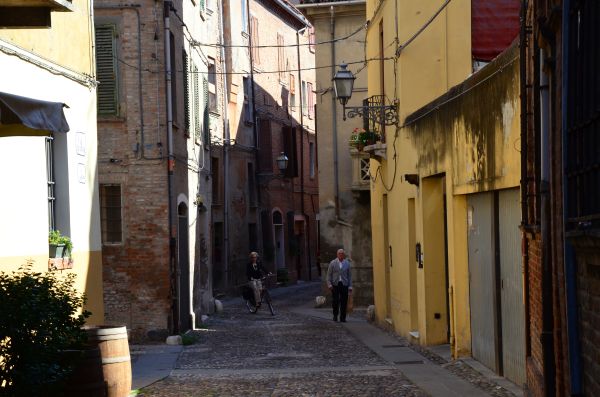
“There is no such thing as Spaghetti Bolognese!!” Simona suddenly screams at me underneath the bustling Bolognese porticoes.
In spite of the bustle, Simona’s voice carries down the street and can be heard echoing in the main square. As is to be expected, I’ve found myself in another excruciatingly awkward moment on the continent. People turn around to see what all the fuss is about. One old man actually stops to stare at me in bemusement until his wife manages to lead him off down the road. I try to convey to passers-by that I’m just as shocked at Simona’s outburst as they are by shrugging my shoulders and raising both my eyebrows. It seems like a fairly standard Italian gesture, but it doesn’t have any effect, because Simona’s gone off on one again:
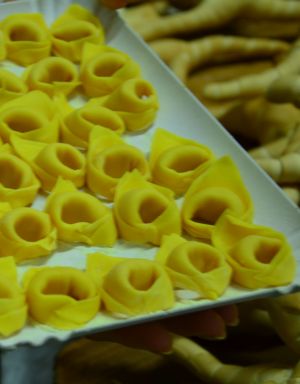 “There is a meat sauce called ragu, it is more meaty than what you have, but never, never, never do we put it with spaghetti. Only with lasagne, or with tagliatelle.” This time she enunciates every word in her thick Italian accent to make sure that I’ve understood what she’s saying.
“There is a meat sauce called ragu, it is more meaty than what you have, but never, never, never do we put it with spaghetti. Only with lasagne, or with tagliatelle.” This time she enunciates every word in her thick Italian accent to make sure that I’ve understood what she’s saying.
I nod to show that I have understood what she’s saying, but nevertheless she continues to rail against the bastardisation of Bolognese cuisine: “IT IS A SIN! You will go straight to hell if you put spaghetti with ragu!”
It’s not surprising that Simona finds it easy to theologise food, not because Italy is a Catholic country and so everything is inevitably some kind of sin, but more because it’s symptomatic of the general European reverence for food. In Germany you can’t go a few days without someone telling you how good their grandmother’s Schweinebraten is. In Spain you can’t go to a bar and have a beer without someone force-feeding you patatas bravas. In France you can’t go somewhere without someone telling you how vastly superior everything is in France.
Yet, although the British like food (especially when there’s lots of it), they don’t respect food. “But I respect food!” you say, oh reader? Well it might be because you’re middle class and you live in the South.
The NHS published its Statistics on Obesity, Physical Activity and Diet a few months ago. In a nutshell they show that household purchases of fruit and vegetables were highest in the South and lowest in the North, and that the higher the income, the more likely you are to consume five or more portions of fresh fruit or vegetables a day.
If you take a basic respect for food at heart to mean fresh produce, then the statistics indicate that Rich Southerners are far more likely to respect food than Poor Northerners. This is because in Britain, gastronomy is elitist. Good food is the preserve of the wealthy. In Europe, however, good food is classless; it is respected and enjoyed by all. In fact for the Europeans a respect for their national cuisine almost acts as a national cohesive and a source of patriotism in their increasingly pluralistic societies. All Italians whether from the North or the South can be certain that Spaghetti is Italian, and can take pride in that. Likewise the French can defend their eating of snails and frogs legs as national idiosyncrasies. In essence, gastronomy plays a stronger role in the cultural integrity of European nations than it does in Britain. But the end result of this respect for food, is that eating ultimately pervades all aspects of life and culture, as is the case in Northern Italy…
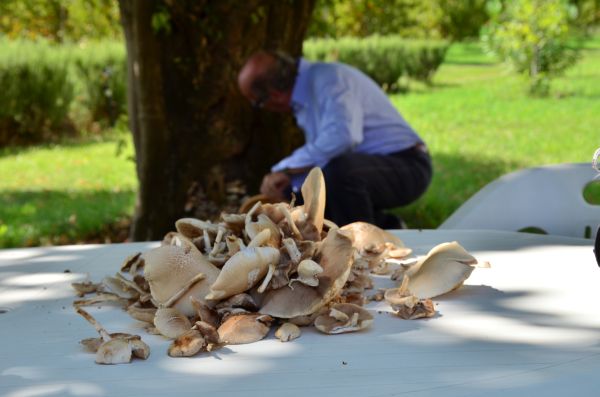
The reason I was being screamed at by Simona in Bologna all those months ago was to see the sites picked out by UNESCO for their cultural or historical heritage. In Bologna UNESCO has picked out the city’s porticoes as culturally unique and valuable. However, Simona spent about a minute pointing to a portico, and explaining that Bologna has more medieval porticoes than anywhere else in Europe. I don’t know if this is true, I just took her word for it.
Carrying on our whistle-stop tour of the city, we also managed to get to look around Bologna University, the oldest in Europe, before pootling off to la Strada del Jazz or “Jazz Street”. Unbeknownst to me, Bologna is apparently the best city in Europe for jazz. Indeed, so rich is the jazz heritage in Bologna, the city was voted UNESCO City of Music in 2006 and every year there is a large jazz festival in the city which attracts some of the greatest musicians in the world. The street is lined with jazz bars, and the city has even carved Hollywood Boulevard-style stars which bear the names of jazz legends into the street.
But with all these cultural highlights there is the constant, looming presence of UNESCO. It almost seems as if something cannot be culturally valuable in Bologna if UNESCO hasn’t given the go-ahead. What’s more it seems that whenever UNESCO has decided that something is of cultural merit, it suddenly loses any appeal for Bolognese residents. Instead it is the city’s food that gets everyone’s pulses racing. Simona does not speak passionately about the city’s porticoes, but 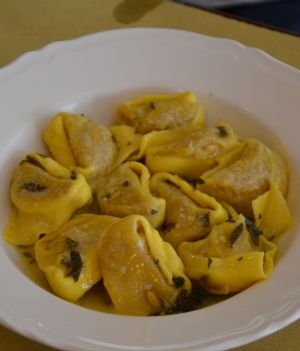 she sure loves to talk about tortellini.
she sure loves to talk about tortellini.
So it is not surprising that the city’s true character emerges at night, over a few glasses of Lambrusco and some exquisite food.
I am in the Bravo Caffé, a restaurant-cum-jazz bar off the Strada del Jazz. We’ve just had some Tortellini con Brotta, our first of God knows how many courses, when during some careless small talk over a slow burning candle, I ask my dinner companion Giorgia what the Bolognese stereotype is. She laughs. Throwing her hair back before shaking her head with a knowing smile and an eyebrow raised.
“Here in Bologna, we are known as la Dotta y la Grassa.”
This phrase La Dotta y la Grassa, or the wise and the fat, neatly encapsulates Bologna’s way of life. The city has a rich culture, clear from its architecture, its University, even its music. Yet if it weren’t for the city’s food, this cultural heritage would run the risk of appearing stale and inaccessible. Gastronomy breathes life into this cultural behemoth, in a way which is uniquely European, if not uniquely Italian.
Indeed even our restaurant in Bologna, the Bravo Caffé, is an example of the pervasive nature of food in Italy. Was it a restaurant? Or was it a jazz bar? The food was of the same calibre of any fine London eatery, as was the jazz, but one could not be truly enjoyed without the other.
This was also the case in Ferrara. It is a beautiful town and is also listed by UNESCO as possessing a unique cultural heritage, this time because of its place in the History of Renaissance Architecture. Ferrara is the only major Italian city to have an original city plan not derived from a Roman layout. The city developed from the 14th century onwards and so was built according to modern Renaissance town planning. But although UNESCO is very aware of Ferrara’s Renaissance Town Planning, it’s failed to identify another feature of Ferrara’s unique cultural heritage: their bread. It is called La Coppia, meaning couple, and is supposed to represent two people caught in flagrante delicto, because even love-making has to be livened up with some food.
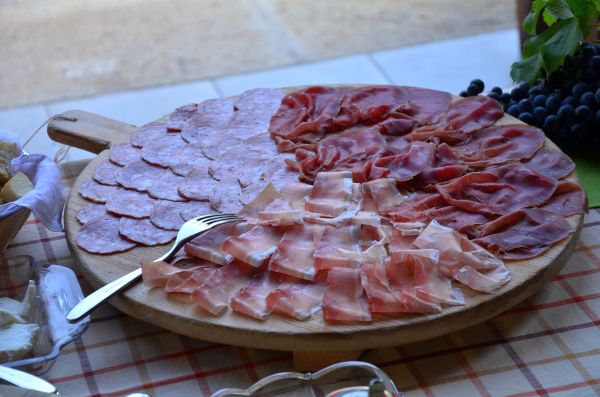
After Ferrara I headed to a remote spot on the outskirts of Rovigo, before heading on to Mantua and Sabbioneta, two towns that also have remarkable architecture and a cultural heritage. Verdi set Rigoletto in Mantua, Virgil was born in Mantua, and Dickens and Dante both mention the town in their work (albeit pejoratively); but always in every town and city in the region, you are incessantly followed by good food and good drink.
This reached its zenith in rural Rovigo as I lay by the dark blue pool in the late Italian summer looking out over the vines and orchards glowing underneath the warm amber sunlight. The air had that heavy quality which incapacitates you, forcing you to relax. The owner of the farm at which I was staying was busying himself in a corner of the courtyard, gathering wild mushrooms from underneath a tree. His daughters were laying the table with local hams, cheeses and fruit from their farm. I don’t even need to tell you how delicious that lunch was, because we already know that it was sublime.
…But as O’Brien comes back from the dingy bar with another set of cloudy, brown ales, and a slight drunken grimace on his reddish face, I know that it’s impossible for Britain to love food. If we did, we’d never get anything done.
Where to Eat:
Bologna
Bravo Caffè,
Via Mascarella 1,
40126 Bologna,
Tel. +39 (0)51 266112
Ferrara
Cusina e Butega,
Corso Porta Reno 26,
44121 Ferrara,
Tel. +39 (0)532 209174
Mantua
Grifone Bianco,
Piazza Erbe 6,
46100 Mantua,
Tel. +39 (0)376 365423
Where to Stay:
Bologna
Hotel Metropolitan
Via dell’Orso 6 40120 Bologna
Rovigo
Agriturismo Corte Carezzabella,
Via Marconi Guglielmo 752,
45030 San Martino di Venezze,
Rovigo
Tel. +39 (0)425 176157
Mantua
Hotel La Favorita,
Via S. Cognetti De Martiis 1,
46100 Mantua,
Tel. +39 (0)376 254711




